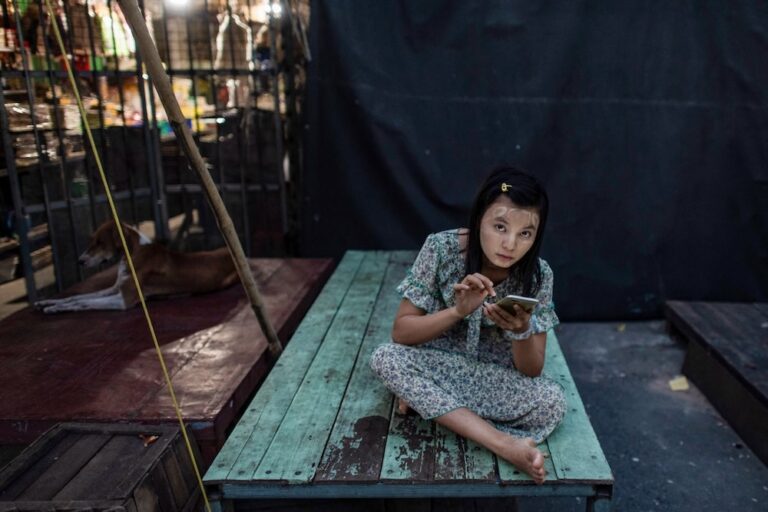IFEX members welcome the release of Reuters reporters Wa Lone and Kyaw Soe Oo and press for greater protection of press freedom in Myanmar.
Reuters reporters Wa Lone and Kyaw Soe Oo are now reunited with their families after spending 511 days in detention for the charge of violating the 1923 Official Secrets Act.
“I’m really happy and excited to see my family and my colleagues. I can’t wait to go to my newsroom,” said Wa Lone after being released on 7 May.
The two journalists were sentenced to seven years in prison for their investigative reporting on the massacre of 10 Rohingya Muslims in the northern Myanmar state of Rakhine. They were arrested in December 2017 after the police accused them of stealing documents which allegedly undermined the country’s security.
Their findings were subsequently published by Reuters in 2018 which led to the sentencing of soldiers involved in the killing of Rohingya residents. But they remained in jail and their conviction was upheld by the Supreme Court in April. Their supporters said there was no clear proof of crime presented in the court and that the judge failed to consider the testimony that the police targeted the two for a set-up operation.The case reflected the failure of the supposedly reform-oriented National League for Democracy to reverse the repressive policies of the former military-backed government.
A global campaign calling for their release also highlighted the continuing challenges faced by the media. They received various accolades from international media groups and institutions including the UNESCO/Guillermo Cano World Press Freedom Prize, which was awarded to them on World Press Freedom Day, four days before their release. UNESCO noted that “they were arrested because they documented a taboo topic regarding crimes committed against Rohingyas.”
IFEX members launched several initiatives that sustained the campaign for their freedom.
‘We are very happy’ – wife of freed #Reuters reporter says https://t.co/a3Nz046QSM pic.twitter.com/zm9JBeKwyK
— Mizzima News (@MizzimaNews) May 7, 2019
The two were finally released from Insein jail after they were included in the pardon granted by President Win Myint to 6,520 prisoners during the country’s traditional New Year.
But Reporters Without Borders (RSF) noted that the pardon upheld the conviction which could set a ‘dangerous judicial precedent’ for other journalists facing similar prosecution. It added that the case of the two reports “is emblematic of investigative journalism’s importance for the functioning of democracies.” It also recognized the role played by civil society groups and leaders “who never forgot the fate of these two journalists and kept fighting for them until this successful outcome.”
Reuters was also praised for defending their reporters and pursuing their release. UN Special Rapporteur on freedom of opinion and expression David Kaye wrote how Reuters “stood with their journalists at every step” and suggested that this should be a “model for outlets everywhere.”
Committee to Project Journalists (CPJ) echoed the assertion of many groups that the two should never have been charged and jailed in the first place. CPJ senior Southeast Asia representative Shawn Crispin is hoping that their release will “herald a new era of press freedom in Myanmar, where reporters no longer fear reprisal merely for doing their jobs.”
The International Federation of Journalists urged authorities to follow this up with the dropping of charges against other journalists facing trial.
“We urge the Myanmar Government to immediately drop all outstanding charges against journalists and the media, an issue that continues to hinder media freedom, instead creating a culture of fear and intimidation.”
They are free now. pic.twitter.com/ZOM4xDVVN1
— ATHAN (@athan_info) May 7, 2019
Pen America insisted that the two “should now be allowed to return to their work without hindrance.” PEN International said the government can rectify the injustice it committed by repealing draconian laws.
“The 500 days they have lost cannot be brought back. But Myanmar must urgently amend its Official Secrets Act, which is penalising those who speak the truth and benefits only those who have something to hide.”
Human Rights Watch warned that the “faltering respect for media freedom indicates the dire situation facing human rights and democracy as the country moves toward national elections in 2020.” It also cited the rising number of defamation cases filed by authorities against critics, journalists, and activists.
The Southeast Asian Press Alliance shared the commitment of media groups which vowed to continue monitoring the situation in Myanmar and the promotion of freedom of expression:
“The regional and global communities advocating for press freedom will be keeping a close watch on what comes next in Myanmar now that the two journalists are out of prison. It’s one thing to free two incarcerated journalists and it’s another to give free rein to all others who must do their job to keep the public informed.”



